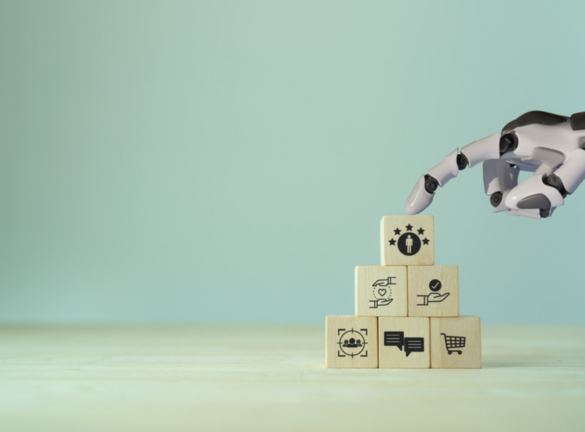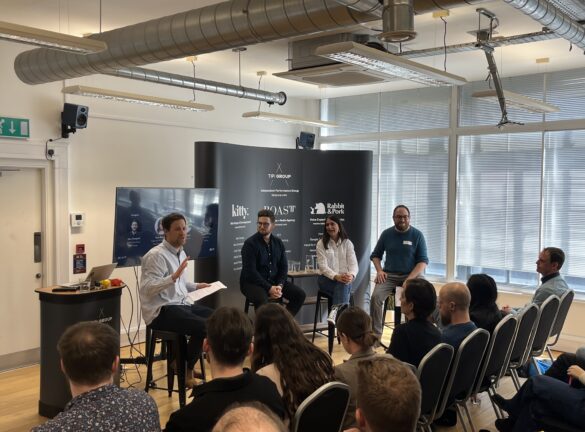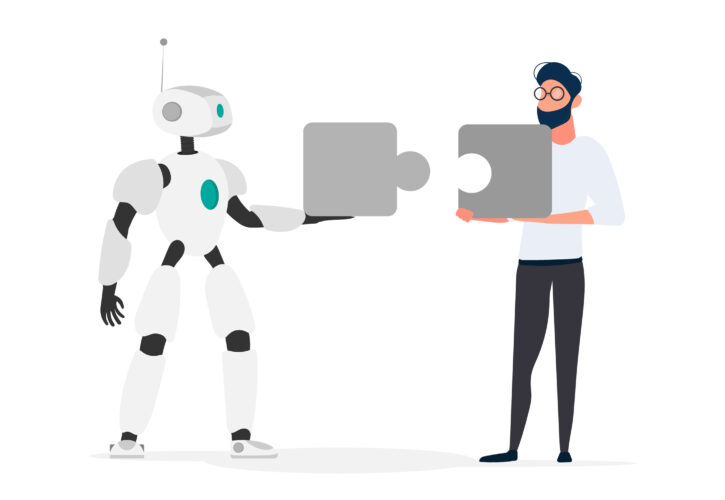
Will LLMs herald the start of a digital transformation for digital marketing agencies?
Following TIPi Group’s recent Shaping the Future event in which the subject of how emerging AI tools can be used in digital marketing was explored, I turn to discuss the benefits of LLM technology in digital marketing agencies. It’s not taken long for digital marketing agencies to adopt and see the benefits of LLM technology, for instance, with ChatGPT.
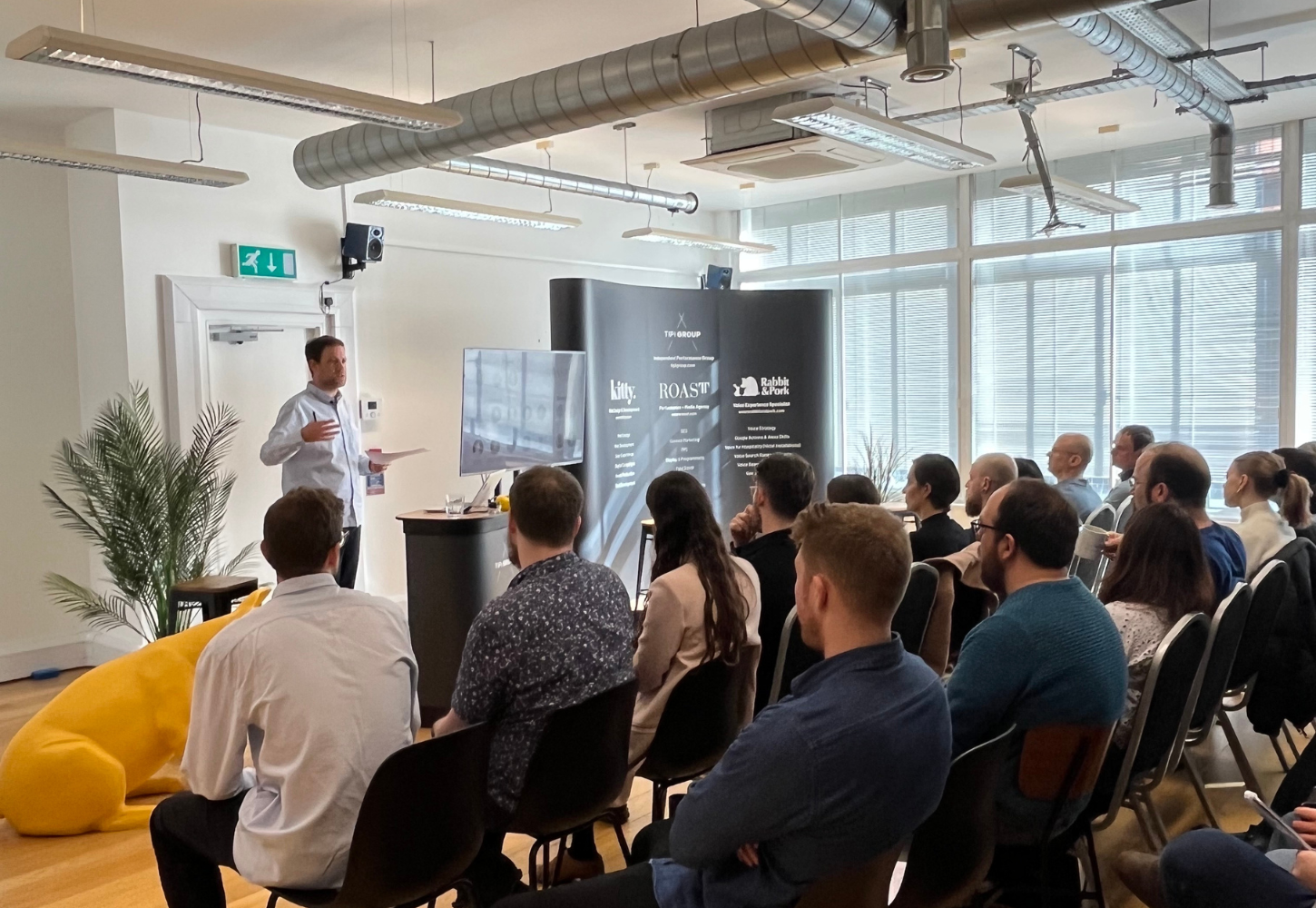
It is generally documented in LinkedIn posts that the majority of uses for LLMs are to complete mundane tasks, assist with coding, create copy briefs, and create content briefs. Initially, the obvious use case for this technology in the digital marketing world has been to generate written copy. That might be for websites, meta data, or ad copy. However, if you have actually tried to use LLMs to generate such content then you may be aware that it doesn’t always deliver accurate and quality copy. For example, looking at meta and ad copy for the key phrase ‘Holidays in Turkey’, the below table compares the results from ChatGPT4 and the real, human-created, data.
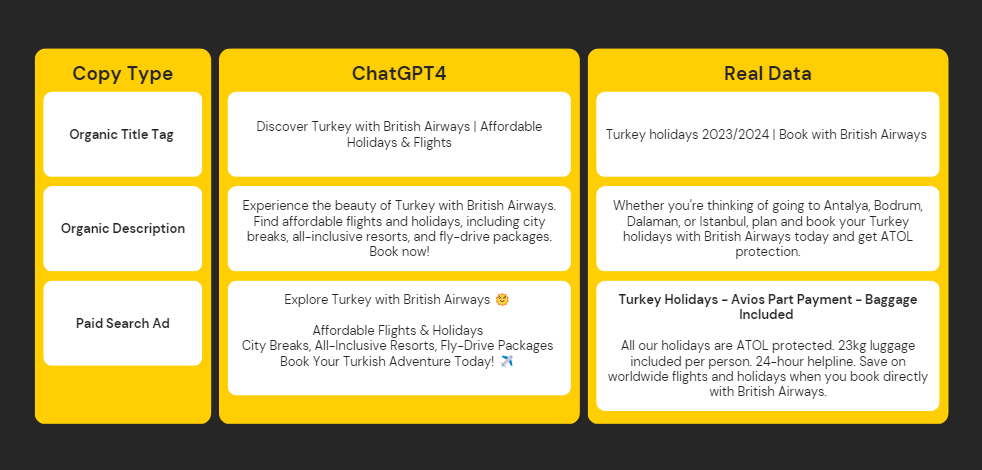
As you can see, the version from ChatGPT misses any mention of 2023/2024 in the title tag and even suggests city breaks and “fly drive”, options you would not typically choose when visiting Turkey. By contrast, the description in the real data identifies well-known holiday locations in Turkey and includes the mention of ATOL protection.
So, as of now, this is where the “human” does the better job, bringing the knowledge of what works for certain locations or combinations of products, seasonality, branding, culture, adjustments per target, what deals are on offer, the fact that ATOL protection helps build trust, locations in the country…the list goes on.
Truth be told, these are all things that LLMs could learn over time, eventually having the ability to produce more accurate prompts or gather with extra data. It’s only a matter of time before that happens, and so, the big question is: will LLMs herald the start of a digital transformation for digital agencies?

When it comes to copy creation, it’s not farfetched to suggest a possible future in which the job of an agency could focus on two areas:
- The creation and optimisation of custom large language models for a brand
- Human editing, model adjustments, and feeding external data into the model
This way of operating would be a TRUE digital transformation step for agencies as a real change in the day-to-day task of creating and editing copy for use on websites and advertising.
Taking a step back and looking at the first point: what are custom large language models?
As you may know, LLMs power tools, including Google’s Bard or OpenAI’s ChatGPT, and the models are trained with content from the internet and other sources. The resultant text generated from these tools is then, therefore, a “vanilla mashup” of all the content.
On ChatGPT, you can set a role for the assistant, for example, “You are a helpful assistant with the tone of voice of a luxury hotel group which is family friendly…”. All subsequent content will then follow this tone of voice. However, on the flipside, certain facts about your company will be missing. For example, ad copy generated about hotel facilities will be generic and, perhaps most importantly, not at all based on your specific hotel. This is problematic because you might end up with ad copy that states you have a “heated outdoor swimming pool”, despite that you do not, in fact, have a heated outdoor swimming pool. Similar to the above example which mentions fly-drive holidays in Turkey. These errors as such are known as hallucinations: the information seems right and appears to be plausible, but it is factually incorrect.
This is where the custom element comes in: a merger of the “LLM foundation model” and your brand’s tone of voice, website content, knowledge base, brand guidelines, offers, AdWords data, seasonality of sales, photography, and videos – all thrown in as training data. We’ve seen a similar example of this with BloombergGPT, a model purpose build for finance, another example being BioGPT for Biomedical usage.
This new custom model means requests are being answered in your brands tone of voice, your facts, and information about your product. It knows that Antalya, Bodrum, Dalaman are the top destinations in Turkey from your sales data and that fly-drive packages are not offered there. You still need your AM to create the prompts and check over the results but overall, the process could be quicker and help with accounts with a huge combination of products and languages.
Google provided a demo of this using Vertex AI, a product of theirs which powers a marketing app to be used by marketing teams, see below:
Now let’s turn to the elephant in the room…agencies are often paid on an hourly fee. 40 hours per month x £100 per hour for an Account Manager. If that AM spends 15 hours a month updating ad copy for new campaigns and A/B testing, the question is raised: do we cut by 14 hours since it takes them only 1 hour to check over the ad copy created by AI? As an industry we must be open to this question. Many digital transformation projects are conducted for cost saving reasons, to make processes easier, and utilise the latest technology.
Do I think this will happen? Will in-house teams be able to send a simple request to an LLM to create all the marketing assets for a new campaign? Will the role of an AM in PPC and SEO departments drastically change?
In short, I don’t think much is going to change any time soon. However, some early possible changes could be:
- Some reduction in hours and costs on certain types of accounts (e-commerce, large combination of products, and multilingual, where campaigns are running on multiple platforms)
- Fees stay the same, but the hours shift to be able to do more analysis and adjustments as you can run more ads & platforms than before
- The ability to service accounts with the same level of detail and focus. For instance, often ecommerce sites’ sections are split into priority areas (Tier 1, 2, 3, etc.). Tier 3 only receives a generic boiler plate meta content and one paragraph of content.
- SaaS based models so that fees are reduced, but there is a monthly fee to run the tech side of things
- Two tier accounts, one with AI and one without
- In house take responsibility for a custom model which is then given to agencies to use
So, returning to the question in focus, will LLMs herald the start of a digital transformation for digital agencies? The answer is not yet, however, digital transformation projects take time, and as such, it is not something that will happen overnight for agencies.



